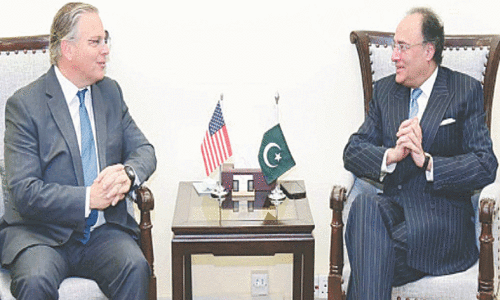LAHORE, June 15: The new Punjab government will present on Monday (today) the provincial revenue budget for the fiscal 2008-09 amounting to around Rs400 billion - give or take a few billions, which is substantially up from the outgoing year's original estimate of above Rs356 billion.
Officials involved in the preparation of the budgetary proposals for the next year told Dawn on Sunday that the provincial government was able to substantially upsize the revenue budget for the coming year because of the projected increase in the size of the all straight and federal transfers under the National Finance Commission (NFC) award.
Punjab is projected to receive above Rs292 billion, up from the current year's estimates of Rs226 billion, in federal transfers next year due to mainly two factors. One, the federal government expects to collect Rs250 billion more in tax revenue next year from the outgoing year's collection of about Rs1 trillion. Two, the provincial share in the NFC will be raised by one per cent to 43.5 per cent next year under the interim NF resource distribution formula between the centre and the provinces and among the provinces being applied.
“Both the factors ensure that provinces get heftier amounts from the central government next fiscal,” a senior finance department official told this reporter.
He said the province had received from the federal government around Rs7 billion fewer than the projected amount due to shortfall in the collection of federal taxes that form part of the federal divisible pool under the NFC award.
Talking to Dawn on the eve of the budget, Punjab Finance Minister Tanvir Ashraf Kaira described the next budget as pro-poor and pro-growth. He said the government would provide both cash and food subsidy to the people in order to protect them against the elevating food prices.
He did not tell the size of the subsidy but officials said it could be upwards Rs20 billion.
Kaira said the food price subsidy would be given across the board while cash subsidy was meant only for the poor. The cash subsidy is likely to be distributed on the lists of the poorest of the poor prepared by the Baitul Maal and verified by National Database and Registration Authority (Nadra). The provincial government is also set to cut the size of its Annual Development Programme (ADP) between Rs130 and Rs135 billion for the next fiscal from the original estimates of Rs150 billion for the outgoing year. The ADP for the next year will be greater than the current year's actual development spending of almost Rs122 billion. The ADP spending is said to have been revised this year due to the resource crunch as well as lack of capacity to utilize the allocated funds.
“I won't say that we are decreasing the size of the provincial ADP for the next year from Rs150 billion. I say we are increasing it from what - almost Rs122 billion - the province spent this year on development,” Kaira had said in an interview with this reporter a few days back. He had said the original estimate of the development programme for the outgoing year was “unrealistic”.
“The previous government inflated the revenue estimates as well as development spending for the outgoing year for gaining political mileage,” he said.
“We shall be more realistic while making allocations and spend every rupee we budget for development in the province. We will avoid revision of the size of the development programme because it affects the process of development.”
Kaira said the provincial government also intended to tax the richer segments of society by taxing luxury items and cars and increasing the rate of property tax in posh localities.
He did not say if the government had any intention to impose any new tax or levy, but admitted that the provincial taxes were being reshuffled to enhance province own tax resource base.
It may be recalled that the previous government had raised the target of tax revenue for the outgoing year by 22.97 per cent from Rs30.343 billion. But the province is feared to miss its collection by over 30 per cent.
Kaira said the tax target would be rationalised. He said the new coalition, which is presenting its first budget, would make realistic estimates of revenue generation and current and development expenditure and wouldn't be imprudent like the previous rulers.















































Dear visitor, the comments section is undergoing an overhaul and will return soon.